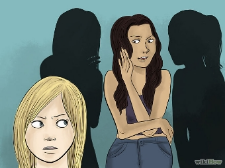Best Friends or Frenemies?
One of the challenges that comes up most often in our adolescent girls' groups is what to do when you have a friend who you like but who also leaves you feeling isolated, embarrassed, held hostage emotionally or fighting for a place in your peer group. Sometimes this friend can be really sweet and thoughtful, and at other times she may be mean, distant or gang up with your other friends to leave you on the outs. Maybe she uses the threat of losing her friendship or losing status in the group to get you to do what she wants. Maybe she tells other friends not to talk to you until you change your ways. Maybe she has some unseen power that makes all the girls around her want to be in her Number One spot, and when you're bumped down to second-tier friend you feel like you have to fight for your place in her good graces. Maybe sometimes you even find yourself using secrets to get close to someone or to hurt someone, talking about a friend behind her back, or changing seats in the lunch room to get back at a friend who hurt your feelings.
When this type of targeted friendship manipulation occurs, we have a word for it: relational aggression. Relational aggression is when someone uses the relationship itself as a means of holding power over another; your relationships with the aggressor and your relationships with others are at risk. Relational aggression is a form of bullying when it is sustained over a long period of time, involves a perceived or real power difference (like popularity, size, age) and is unidirectional (meaning one person targets the same other person over and over again). Relational aggression can also be occasional, occur between those of perceived or real equal power and multi-directional. This is the most common form of relational aggression that you'll see in school, among both boys and girls. Sometimes one friend takes on the role of relationship manipulator, sometimes another friend is giving you the silent treatment, and sometimes you find yourself teaming up with another friend to exclude someone else.
Rosalind Wiseman of Queen Bees and Wannabes fame has some sound advice for girls who find themselves struggling with a frenemy (friend one day, enemy the next). To step out of the relational aggression tango, it can sometimes mean reaching out to a trusted adult for guidance, talking directly with the friend, settling clear boundaries and sometimes even ending the friendship. When relational aggression becomes sustained bullying, it's definitely time to enlist support. It can feel very isolating having to deal with this on your own, and terrifying to think about confronting the aggressor. There's no one right way to handle a tough situation like this, so just remember that you are not alone. Here's Rosalind's words of advice:

